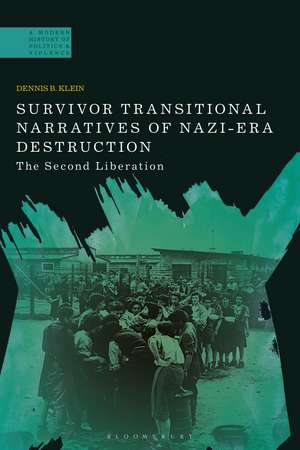Survivor Transitional Narratives of Nazi-Era Destruction: The Second Liberation: A Modern History of Politics and Violence
Autor Professor Dennis B. Kleinen Limba Engleză Paperback – 21 aug 2019
| Toate formatele și edițiile | Preț | Express |
|---|---|---|
| Paperback (1) | 232.07 lei 43-57 zile | |
| Bloomsbury Publishing – 21 aug 2019 | 232.07 lei 43-57 zile | |
| Hardback (1) | 716.39 lei 43-57 zile | |
| Bloomsbury Publishing – 15 noi 2017 | 716.39 lei 43-57 zile |
Preț: 232.07 lei
Preț vechi: 297.75 lei
-22% Nou
Puncte Express: 348
Preț estimativ în valută:
44.41€ • 46.48$ • 36.96£
44.41€ • 46.48$ • 36.96£
Carte tipărită la comandă
Livrare economică 31 martie-14 aprilie
Preluare comenzi: 021 569.72.76
Specificații
ISBN-13: 9781350112315
ISBN-10: 1350112313
Pagini: 288
Dimensiuni: 156 x 234 x 20 mm
Greutate: 0.41 kg
Editura: Bloomsbury Publishing
Colecția Bloomsbury Academic
Seria A Modern History of Politics and Violence
Locul publicării:London, United Kingdom
ISBN-10: 1350112313
Pagini: 288
Dimensiuni: 156 x 234 x 20 mm
Greutate: 0.41 kg
Editura: Bloomsbury Publishing
Colecția Bloomsbury Academic
Seria A Modern History of Politics and Violence
Locul publicării:London, United Kingdom
Caracteristici
Uses an interdisciplinary approach that encompasses the history of emotions, psychology, philosophy, religion, and literary criticism
Notă biografică
Dennis B. Klein is Professor of History, Director of the Master of Arts in Holocaust and Genocide Studies program, and Director of the Jewish Studies Program at Kean University, USA. He is also the founding director of the Anti-Defamation League's Braun Center for Holocaust Studies. He is the author of Jewish Origins of the Psychoanalytic Movement (University of Chicago Press, 1985) and the editor of Societies Emerging from Conflict: The Aftermath of Atrocity (forthcoming).
Cuprins
AcknowledgmentsIntroduction: Unseen1. Traumatic Memories and Historical Memories2. Historical Emotions3. Narrative Disclosure: Jean Améry4. Betrayal and Its Vicissitudes5. Critical Forgiveness6. Deep Transitions: A Conclusion Resisting FinalityEndnotesBibliographyIndex
Recenzii
The book's importance can be found in the way in which complexity, ambiguity and occasionally contradiction in survivor accounts, are dealt with. Nuanced readings and analyses, both of the three primary authors's works and a significant array of always relevant secondary literature, inform the impressive scholarship behind the book . [It] does not shy away from complexity and this is its strength.
In this insightful and nuanced book, Dennis Klein highlights the relevance of Holocaust testimony and survivor narrative. His unique approach points specifically to Holocaust narratives as "transitional", enabling survivors to be subjects in a collective and shared humanism of the future, in which they and their memories remain constitutive partners in the rethinking of politics, human rights, and global social responsibility.
A truly original and provocative study of how key survivor narratives emerged in the Jewish and wider public in the 1960s-and why they remain significant. It will be appreciated and acclaimed by a wide array of students and scholars from disciplines spanning the humanities and social sciences.
Accordingly, not only is this study essential reading for scholars of Holocaust and genocide studies, Jewish studies, and Memory studies, but for students and those working in retributive justice, trauma, and conflict aftermath ... [The] book's analytical techniques are unassailable, and Klein's theoretical insights provide an illuminating window into the texts under discussion.
In this insightful and nuanced book, Dennis Klein highlights the relevance of Holocaust testimony and survivor narrative. His unique approach points specifically to Holocaust narratives as "transitional", enabling survivors to be subjects in a collective and shared humanism of the future, in which they and their memories remain constitutive partners in the rethinking of politics, human rights, and global social responsibility.
A truly original and provocative study of how key survivor narratives emerged in the Jewish and wider public in the 1960s-and why they remain significant. It will be appreciated and acclaimed by a wide array of students and scholars from disciplines spanning the humanities and social sciences.
Accordingly, not only is this study essential reading for scholars of Holocaust and genocide studies, Jewish studies, and Memory studies, but for students and those working in retributive justice, trauma, and conflict aftermath ... [The] book's analytical techniques are unassailable, and Klein's theoretical insights provide an illuminating window into the texts under discussion.












